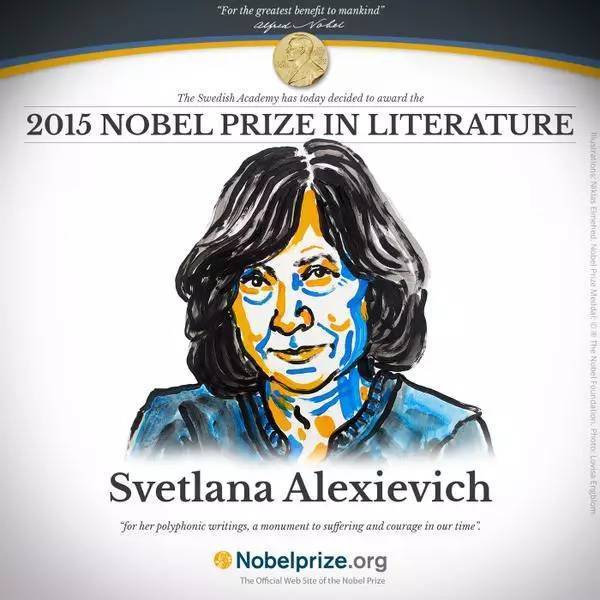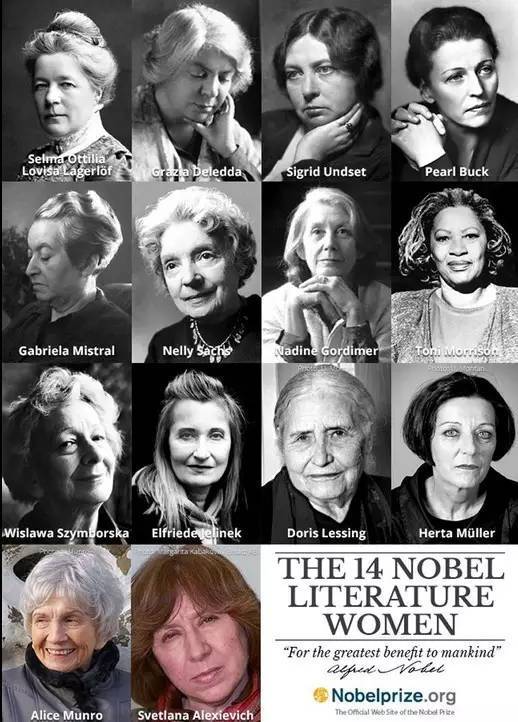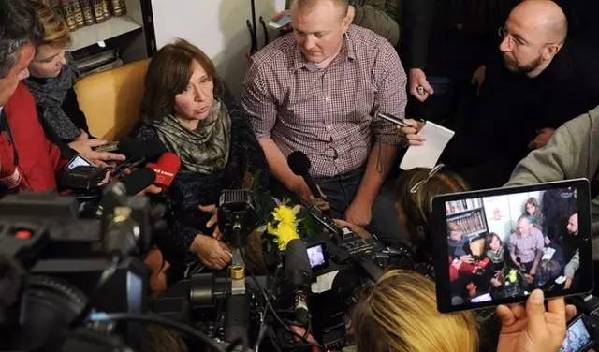當前位置: Language Tips> 名著選讀
分享到

北京時間10月8日晚上7點,瑞典文學院常任秘書薩拉·達尼烏斯(Sara Danius)在瑞典文學院(The Swedish Academy)會議廳宣布了2015年諾貝爾文學獎獲得者為白俄羅斯女作家、記者:斯韋特蘭娜·阿列克西耶維奇。

她也是歷史上第14位獲得諾貝爾文學獎的女作家:

在隨后接受采訪時達尼烏斯這樣評價她:

For the past 30 or 40 years she's been busy mapping the Soviet and post soviet individual, but it's not really about a history of events. It's a history of emotions – what she's offering us is really an emotional world, so these historical events she's covering in her various books, for example the Chernobyl disaster, the Soviet war in Afghanistan, these are in a way just pretexts for exploring the Soviet individual and the post-Soviet individual.
She's conducted thousands and thousands of interviews with children, with women and with men, and in this way she's offering us a history of human beings about whom we didn't know that much ... and at the same time she's offering us a history of emotions, a history of the soul.
談及獲獎,阿列克西耶維奇顯得很淡定,一句話帶過:
On the one hand, it's such a fantastic feeling, but it's also a bit disturbing.
倒是獎金,她覺得(我們也都覺得)還是很有用的:
It takes me a long time to write my books, from five to 10 years. I have two ideas for new books so I'm pleased that I will now have the freedom to work on them.

前面說過,她是白俄羅斯女作家,做過很多年的記者,最為人熟知的作品是《戰爭的非女性面孔(War's Unwomanly Face)》、《鋅皮娃娃兵(Zinky Boys: The Record of a Lost Soviet Generation)》、《切爾諾貝利的回憶:核災難口述史(Voices from Chernobyl: The Oral History of a Nuclear Disaster)》,文中都是她走訪戰爭和災難親歷者的口述故事,在文學化的諾貝爾文學獎里,又一次見證了紀實(nonfiction)文學的勝利~
其中《切爾諾貝利的回憶》經過編譯,中譯本《我不知道該說什么,關于死亡還是愛情》已為國人熟知。今天小編選了一段跟大家分享,希望透過文字,可以感受到“她的復調書寫,是對我們時代的苦難和勇氣的紀念(for her polyphonic writings, describing them as a “monument to suffering and courage in our time)。”

A SOLITARY HUMAN VOICE
孤單的人聲
We are air, we are not earth...
我們是空氣,我們不是土地……
—M. Mamardashvili
——馬馬達舒維利
I don't know what I should talk about—about death or about love? Or are they the same? Which one should I talk about?
我不知道該說什么,關于死亡還是愛情?也許兩者是一樣的?我該講哪一種?
We were newlyweds. We still walked around holding hands, even if we were just going to the store. I would say to him, "I love you." But I didn't know then how much. I had no idea... We lived in the dormitory of the fire station where he worked. On the second floor. There were three other young couples, we all shared a kitchen. On the first floor they kept the trucks. The red fire trucks. That was his job. I always knew what was happening—where he was, how he was.
我們才剛結婚,連到商店買東西都還會牽手。我告訴他:“我愛你。”但當時我不知道自己有多愛他,我不知道……我們住在消防局的二樓宿舍,和三對年輕夫婦共享一間廚房,紅色的消防車就停在一樓。那是他的工作,我向來知道他發生了什么事——他人在哪里,他好不好。
One night I heard a noise. I looked out the window. He saw me. "Close the window and go back to sleep. There's a fire at the reactor. I'll be back soon."
那天晚上我聽到聲響,探頭望向窗外。他看到我就說:“把窗戶關上,回去睡覺。反應爐失火了,我馬上回來。”
I didn't see the explosion itself. Just the flames. Everything was radiant. The whole sky. A tall flame. And smoke. The heat was awful. And he's still not back.
我沒有親眼看到爆炸,只看到火焰。所有東西都在發亮。火光沖天,煙霧彌漫,熱氣逼人。他一直沒回來。
The smoke was from the burning bitumen, which had covered the roof. He said later it was like walking on tar. They tried to beat down the flames. They kicked at the burning graphite with their feet...They weren't wearing their canvas gear. They went off just as they were, in their shirt sleeves. No one told them. They had been called for a fire, that was it.
屋頂的瀝青燃燒,產生煙霧。他后來說,感覺很像走在焦油上。他們奮力滅火,用腳踢燃燒的石墨……他們沒有穿帆布制服,只穿著襯衫出勤,沒人告訴他們,他們只知道要去滅火。
Four o'clock. Five. Six. At six we were supposed to go to his parents' house. To plant potatoes. It's forty kilometers from Pripyat to Sperizhye, where his parents live. Sowing, plowing—he loved to do that. His mother always told me how they didn't want him to move to the city, they'd even built a new house for him. He was drafted into the army. He served in the fire brigade in Moscow and when he came out, he wanted to be a fireman. And nothing else! [Silence.]
四點鐘了。五點。六點。我們本來六點要去他爸媽家種馬鈴薯,普利彼特離他爸媽住的史畢懷塞大約四十公里。他很喜歡播種、犁地。他媽媽常說,他們多不希望他搬到城里。他們甚至幫他蓋了一棟房子。他入伍時被編入莫斯科消防隊,退伍后就一心想當消防員!(沉默)
Sometimes it's as though I hear his voice. Alive. Even photographs don't have the same effect on me as that voice. But he never calls to me...not even in my dreams. I'm the one who calls to him.
有時我仿佛聽到他的聲音在我耳邊回響,即使相片對我的影響力都比不上那個聲音。但他從來沒有呼喚我……連在夢里都沒有,都是我呼喚他。
Seven o'clock. At seven I was told he was in the hospital. I ran there, but the police had already encircled it, and they weren't letting anyone through. Only ambulances.
到了七點,有人告訴我他被送到醫院了。我連忙趕去,但警察已經包圍了醫院,除了救護車,任何人都進不去。
The policemen shouted: The ambulances are radioactive, stay away!
警察喊:“救護車有輻射,離遠一點!”
I wasn't the only one there, all the wives whose husbands were at the reactor that night had come.
不只我在那里,所有當晚丈夫去過反應爐的女人都來了。
I started looking for a friend, she was a doctor at that hospital. I grabbed her white coat when she came out of an ambulance. "Get me inside!"
我四處尋找在那所醫院當醫生的朋友,一看到她走下救護車,我就抓住她的白袍說:“把我弄進去!”
"I can't. He's bad. They all are."
“我不能。他的狀況很不好,他們都是。”
I held on to her. "Just to see him!"
我抓著她不放:“我只想見他一面!”
"All right," she said. "Come with me. Just for fifteen or twenty minutes."
“好吧,”她說,“跟我來,只能待十五到二十分鐘。”
I saw him. He was all swollen and puffed up. You could barely see his eyes.
我看到了他,全身腫脹,幾乎看不到眼睛。
"He needs milk. Lots of milk," my friend said. "They should drink at least three liters each."
“他需要喝牛奶,很多牛奶,”我的朋友說,“每個人至少要喝三升……”
"But he doesn't like milk."
“可是他不喜歡牛奶……”
"He'll drink it now."
“他現在會喝的。”
Many of the doctors and nurses in that hospital, and especially the orderlies, would get sick themselves and die. But we didn't know that then.
那所醫院的很多醫生和護士,特別是勤務工,后來都生病死了,但是當時我們不知道危險。
...
(來源:英語環球?NEWSPlus 編輯:丁一)
上一篇 : 最適合今秋閱讀的十本小說
下一篇 :
分享到
關注和訂閱


電話:8610-84883645
傳真:8610-84883500
Email: languagetips@chinadaily.com.cn